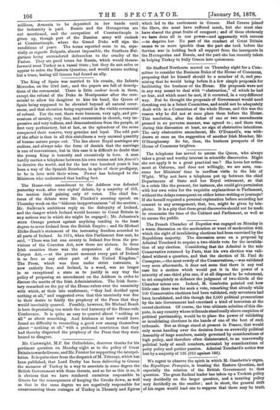The King of Spain was married to his cousin, the
Infanta Mercedes, on the 23rd inst., and the papers are full of descrip- tions of the ceremonial. There is little couleur locale in them, except the refusal of the Duke de Montpensier after the cere- monial to allow his daughter to kiss his hand, the Queen of Spain being supposed to be elevated beyond all natural rever- ences, and that elevation being expressed in the visible ceremonial of refusal. For the rest, there were banners, very ugly, and pro- cessions of cavalry, very fine, and ceremonies in church, very im- pressive and very tedious, and demonstrations from the people, at first very perfunctory, but at last, as the splendour of the scene conquered their reserve, very genuine and loyal. The odd part of the affair is that in all this stateliness a very unusual quantity of human nature peeps out. The lies about Royal marriages are endless, and always take the form of denials that the marriage is one of convenience, but in this case it is difficult to doubt that the young King is honestly and excessively in love. A man hardly carries a telephone between his own rooms and his fencee's to deceive the world, and for the last two hundred years it has been a way of the Spanish Bourbons, in spite of their profligacy, to be in love with their wives. Power has belonged to the Ministers who understood that leading fact.


































 Previous page
Previous page